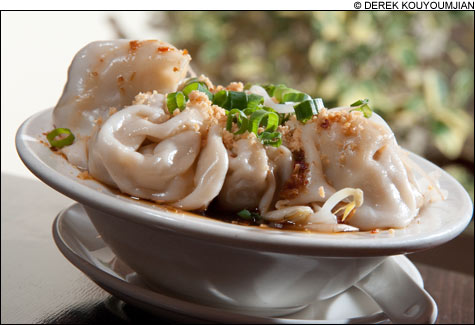
REALLY BIG SHOW The most successfully appetizer at House of Chang is the Suan La Chow Show, five dumplings doused in what tastes like hot and sour soup. |
| House of Chang | 282 Concord Street, Cambridge | 617.547.9888 | open Sunday–Thursday, 11:30 am–10 pm; and Friday and Saturday, 11:30 am–11 pm | AE, DI, MC, VI | No liquor | No valet parking | Sidewalk-level access |
For more than 30 years, this location housed Lucky Garden, one of the first neighborhood Mandarin-Szechuan restaurants in Greater Boston, and one of the best in stretches. Now comes House of Chang, owned by people actually named Chang, and it is a measure of how North and Southwest Chinese cuisine have evolved in the United States from the days of Joyce Chen and Peking on Mystic, when this new, spicier, and more authentic Chinese regional cuisine first reached the area. House of Chang doesn't fully revive the excitement of the first wave of Szechuan cooking, but it does have some swell food at moderate prices.Perhaps the most obvious change is that this cuisine has been either Americanized or Taiwanized (or both) to incorporate more batter frying. Sometimes, as on the scallion pancakes ($3.50), the frying is excellent. (We could use a few more scallions in the scallion pancakes, but the price is right.) Sometimes, as on Beef with Orange Peel ($12.50), which seems to be twice-fried flank steak, the meat and the batter have been caramelized beyond crisp to something requiring a lot of chewing and with the texture of jerky.
Probably the most successful appetizer is Suan La Chow Show ($4), a bowl of five dumplings in light, fresh-pasta wrappers, doused in what tastes like hot-and-sour soup. This dish was introduced to Cambridge at the long-gone Colleen's Chinese Cuisine in Central Square with added bean sprouts. It stayed on the menu when Colleen's became Royal East, was picked up by Mary Chung's, and has since slowly diffused out of Central Square. House of Chang's version loads up on the red-pepper side of the equation, but the meaty dumplings hold their own.
Peking Ravioli ($6) have much thicker wrappers, and are well fried on one side; these are not the "pot-stickers" of yore, but very dippable. Again, the filling seems fresh and meaty, if perhaps short on the traditional ginger.
I also had to look for ginger in Yu Hsiang Spicy Eggplant ($8.50). "Yu hsiang" means "fragrant like a fish," which used to imply ginger, garlic, and enough hot pepper to open the nasal passages to those flavorings. This one is sweeter than most in the past, and a little greasy. It's also short on ginger, but the main vegetable melts in the mouth deliciously. Crunchy stir-fried green bell pepper is a useful and unusual contrast.
An entrée solidly in the old Cambridge Mandarin-Szechuan tradition is Rose Shrimp ($12.95), marked with a chili pepper and featuring lots of large prawns, Chinese black mushrooms (matching texture, contrasting flavor and color), and large slices of water chestnut (matching color, contrasting texture). The sauce is a spicy ketchup, as it always was. I could order four of these for the table and call it a feast.